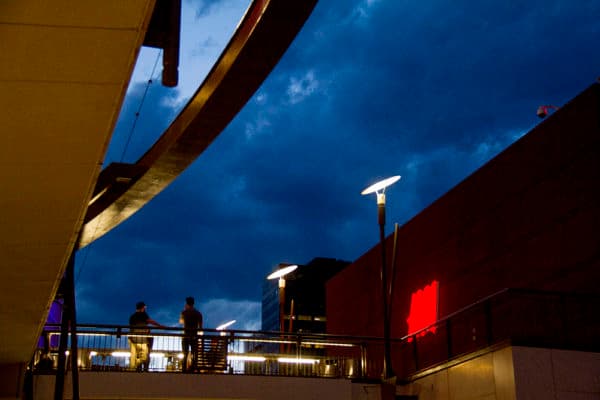In the heart of downtown, Denver Pavilions is bucking the trend of struggling malls by ditching classic, complacent companies for America's next big brands.
The shopping center tucked inside the 16th Street Mall bets on introducing Coloradans to stores they've never shopped before like H&M and Uniqlo, said Mark Sidell, president of Gart Properties.
Despite some setbacks, Denver Pavilions' mix of newcomers and household names seems to be working. Gart Properties recently leased all of the shopping center's third level for the first time and is getting set for the fall opening of Colorado's first Uniqlo store.
"Some landlords are focused solely on the credit, safety and stability of their tenant base. But we're looking more toward a goal of continuing to be fresh, new and compelling for our customers," Sidell said. "All of that involves a little more risk."
In 2011, Denver Pavilions was able to ease tensions about Niketown closing with news that Colorado's first European-based clothing retailer H&M would fill the spot. In October, the mall simultaneously announced Barnes & Noble would be leaving and the Japanese-based clothing retailer Uniqlo would be taking over the space.
Uniqlo has started hiring and is slated to open Sept. 30. The store coming to 16th Street is a testament to the area's thriving young professional and millennial traffic — a population many retailers are going after.
"Location is a huge factor. Our strategy to grow as a company is to enter new markets where people are and create brand awareness," said Rolena Richardson, Uniqlo store manager in Denver.
At the Pavilions, Uniqlo can catch a wide range of Coloradans visiting downtown as well as convention goers and tourists. The location is a good precursor for stores in Boulder, Colorado Springs and Cherry Creek, Richardson said.
Uniqlo isn't the only store that sees opportunity at the mall. In recent months, Victoria's Secret expanded to a new, larger location and the Denver Pavilions announced that it will add women's clothing store Francesca's and a For The Win arcade during the fall.
The arcade would fill out the Denver Pavilions third level.

But 2016 hasn't been entirely a success. In January, the California-based vegan restaurant chain Native Foods Cafe folded its operation on the first floor.
"The issue there wasn't Denver Pavilions. It was Native Foods as they closed all their stores in Denver," Sidell said. "We could have put a McDonald's in there and had a known quantity and attracted a predictable customer base. Instead, we were looking to try something new, and there's more risk involved in that."
Including the roughly 4,000-square-foot space Native Foods used to occupy, the Pavilions has about 8,000 square feet of vacant space. The 350,000-square-foot mall has another roughly 10,000 square feet being occupied by temporary tenants.
Other malls in the state haven't managed the same success without major redevelopments. Longmont and Fort Collins are spending a combined $400 million to overhaul their malls and jump start spending.
In 2011, Westminister agreed to pay $22 million to buy the Westminister Mall property in hopes of destroying the existing buildings and creating a dense downtown area with retail, restaurants and residences.
Many malls have at least one traditional department store – Macy's, Sears, J.C. Penney, etc. – that leases huge chunks of space. That dynamic poses potential problems as big box stores scale back in the face of stagnant sales and steeper competition from online competitors.
In 2000, for every dollar spent at physical stores, just 30 cents were spent online and at mail-order houses. As of April, the online category made up nearly 70 cents for every dollar spent at general merchandise stores, according to the Associated Press.
The Cherry Creek Shopping Center was dealt a blow in 2011 when the high-end department store Saks Fifth Avenue closed. The mall redeveloped the 90,000-square-foot space and filled it with smaller, more diverse stores.
The best stores will be the ones that offer distinct services and products both in-person and online without trying to compete with Amazon on low prices, said DJ Busch, a senior mall analyst at Green Street Advisors.
"The issue is customers have already decided they want the online option or e-commerce part to be a part of their everyday shopping life going forward, so that's something retailers are going to have to adapt to," Busch said in May at a global convention for the shopping center industry.
The Pavilions is adapting by offering a place where people can eat, shop and catch some kind of entertainment. Shoppers can stay on site and bowl or head to a movie or easily get to shows or concerts around downtown.
"People used to say 20 to 30 years ago that the only thing that mattered in our business was location, location, location, but now in addition to that you have to be focused on experience, experience, experience," Sidell said.
"We're really focused on creating experiences that integrate first-to-market and only-in-market retailers. That's critical to differentiating Denver Pavilions from 'Any Mall USA.'"
Business & data reporter Adrian D. Garcia can be reached via email at [email protected] or twitter.com/adriandgarcia.
Subscribe to Denverite’s newsletter here.












